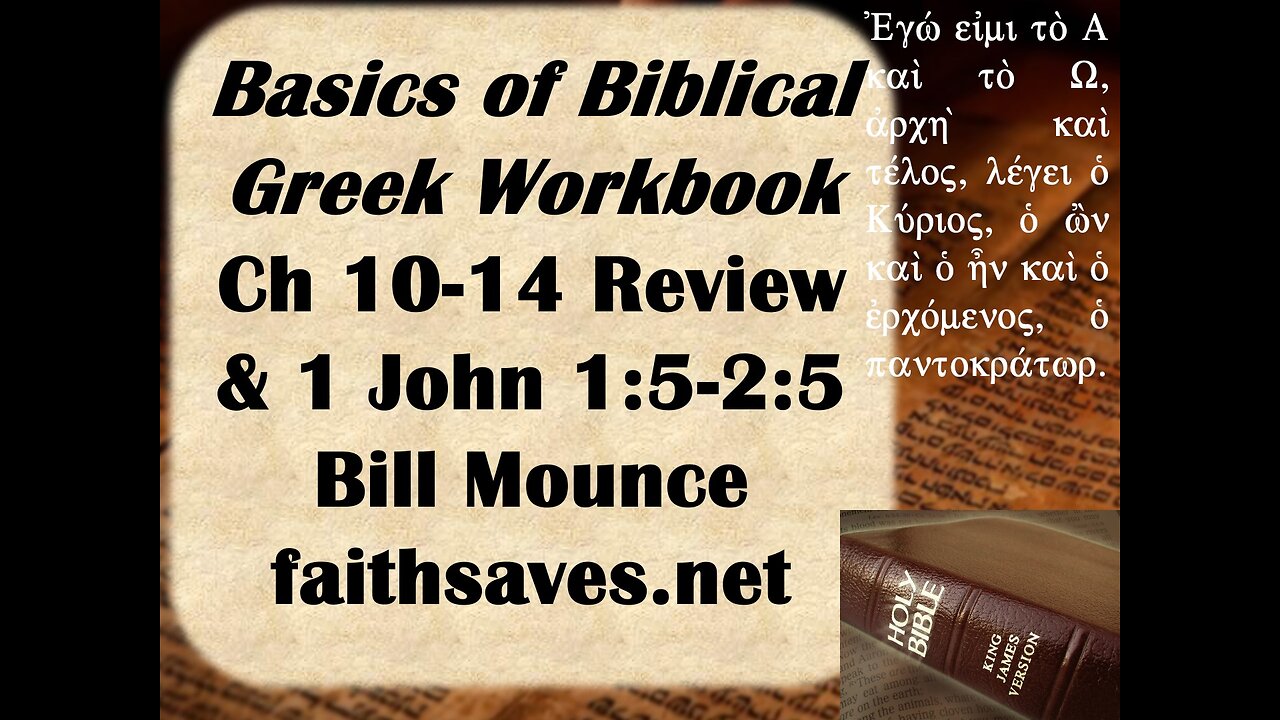Premium Only Content

New Testament / Koine Greek, 1st year, #15: BBG Workbook Chapters 10-14 review & 1 John translation
Lecture #15 in New Testament or Koine Greek, a first year Greek at a college or seminary level taught by independent Baptist professor Thomas Ross, covers the chapter 10-14 review in Dr. Bill Mounce's Basics of Biblical Greek Workbook. 1 John 1:5-2:5 are also translated from the Textus Receptus. Chapters 10-14 in William Mounce's workbook cover third declension nouns, first (ἐγώ), second (σύ), and third person personal pronouns (αὐτός), demonstrative pronouns (οὗτος & ἐκεῖνος), and relative pronouns (ὅς, ἥ, ὅ). The review covers noun rules such as the Square of Stops, noun parsing, case endings, personal pronouns, uses of αὐτός, the Greek article vs. the relative pronoun, vocabulary, and so on. This class completes the study of the Greek noun system.
The translation of 1 John 1:5-2:5 reviews outlines the structure of 1 John and then translates the passages. 1 John goes through three cycles, explaining that assurance comes from the Christian passing the tests of continuing righteousness, continuing love, and continuing belief. Each cycle elaborates upon this same theme. Some professing false converts had separated themselves from the church to which 1 John was written, adopting a sort of proto-Gnosticism. In contrast to the apostates who left the church, the Apostle John set forth the test of continuing righteousness as a mark of true salvation. Likewise, those who had apostatized no longer manifested true belief, but continuing true belief is a mark of genuine conversion, according to John. Those that had separated from the church to adopt the proto-Gnostic heresy did not manifest love for the believers, rejecting them, and rejecting any need to minister to their needs. In contrast to this, the Apostle John set forth genuine love for the brethren as a mark of the regenerate. Those who manifest true righteousness, love, and continuing true belief should be assured of salvation, the Apostle taught, because only those who are born again can manifest these evidences of the new nature, whole those who do not have these marks should not be assured of salvation because they do not have salvation.
After the prologue in 1:1-4, the first cycle is 1:5-2:28, where the Christian life is manifested as fellowship with God, conditioned and tested by walking in the light. In 1:6-2:6, walking in the light is tested by one’s attitude to sin and righteousness. In 2:7-17, walking in the light is manifested by loving one’s brother and not loving the world. In 2:18-28, walking in the light is manifested by continuing belief of true doctrine.
The second cycle in 1 John is 2:29-4:6, where the Apostle John indicates that the Christian life, as one of Divine Sonship, is approved by these same three tests of righteousness, love, and true belief. In 2:29-3:10a he indicates that Divine sonship is tested by righteousness. In 3:10b-24a, Divine sonship is tested by love. In 3:24c-4:6 Divine sonship is tested by belief.
Finally, the third cycle in 1 John is 4:7-5:21, providing a closer correlation of righteousness, love, and belief. 4:7-5:3a expands more on love; 5:3b-21 expands more on belief, with the relationship of righteousness to the Christian and to both love and belief being likewise interwoven within this section.
The main purpose of 1 John is stated in 5:13 just like it is at the end of John’s Gospel in 20:30-31, just like the prologue of 1 John (1:1-4) is comparable to the prologue of John’s Gospel (1:1-18). By the believers knowing that they have eternal life, 5:13, they will also believe more deeply on the name of the Son of God (5:13), will have full joy (1:4), will be protected from sin (2:1), and will be protected from false teachers (2:26), as John also writes them because their sins are forgiven (2:12), because they have known God (2:13), etc. There are many great benefits to having assurance of salvation which are elaborated earlier in 1 John, but they are all subordinate to the main purpose of the book, that believers might know that they have eternal life (5:13). All the “written” statements are reasons the Apostle John wrote 1 John, but they are subordinate reasons to having assurance. That fits the three-cycle structure of 1 John and the comparison with John’s Gospel.
1 John chapter 1 teaches that true believers will characteristically confess their sins as a fruit of the common life (koinonia), fellowship, or communion that they have with the Trinity. Those who characteristically confess sin should have assurance that they have the common life of true believers.
More information on the college class is available on the FaithSaves website in the section on college classes.
-
 LIVE
LIVE
Dr Disrespect
10 hours ago🔴LIVE - DR DISRESPECT - BATTLEFIELD 6 - JET CRASHES, EXPLOSIONS, 360 NO-SCOPES
1,654 watching -
 LIVE
LIVE
RiftTV
3 hours agoTrump SECURES Hostages, ACCIDENTALLY Admits Foreign Gov CONTROLS Him? | The Rift | Gerald Morgan Jr.
731 watching -
 21:44
21:44
Jasmin Laine
4 hours agoTrump Haters SILENCED—Historic Peace Deal PROVES Them ALL Wrong
5265 -
 LIVE
LIVE
SmashJT
2 hours agoEMERGENCY DETAILS | Smashcast
88 watching -
 LIVE
LIVE
LFA TV
23 hours agoLIVE & BREAKING NEWS! | MONDAY 10/13/25
564 watching -
 1:26:42
1:26:42
Katie Miller Pod
3 hours ago $2.42 earnedEpisode 10 - Kellyanne Conway | The Katie Miller Podcast
12.5K1 -
 1:02:23
1:02:23
BonginoReport
3 hours agoTrump Brokers Peace In The Middle East - Nightly Scroll w/ Hayley Caronia (Ep.154)
66.8K21 -
 1:02:11
1:02:11
The Nick DiPaolo Show Channel
5 hours agoTrump Pulls Off Unthinkable | The Nick Di Paolo Show #1803
13.9K9 -
 LIVE
LIVE
Rallied
3 hours agoBF6 with THE BOYS
66 watching -
 LIVE
LIVE
The Mike Schwartz Show
4 hours agoTHE MIKE SCHWARTZ SHOW Evening Edition 10-13-2025
47 watching